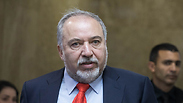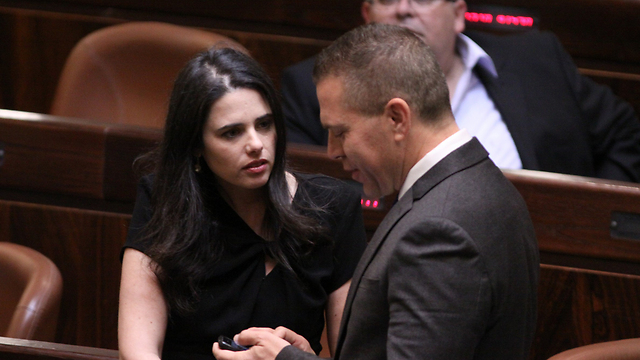
Lieberman storms out of government meeting after objection to death penalty for terrorists
Defense Minister Lieberman shouts and pounds on the table amid objections in the government to his death penalty for terrorists bill, insisting ministers bound by coalition agreements to support his legislation.
Defense Minister Avigdor Lieberman stormed out of a government meeting on Wednesday following a loud confrontation over his bill proposal to impose the death penalty on terrorists.
Lieberman insisted the coalition was obligated to support the bill as part of coalition agreements, shouting "We're all bound by coalition agreements" and pounding on the table.
In an apparent effort to calm tensions, Prime Minister Benjamin Netanyahu quipped, "You almost broke the table."
The government meeting on Wednesday convened to discuss a different matter—a plan by Public Security Minister Gilad Erdan and Interior Minister Aryeh Deri to remove illegal African migrants from Israel.
During the meeting, Energy Minister Yuval Steinitz insisted on discussing Lieberman's death penalty for terrorists bill proposal instead, which led to the confrontation with the defense minister.
"It's the worst thing Israel can do to itself," Steinitz said. "The damage to the State of Israel could be massive. We're playing into the hands of our worst enemies."
Culture and Sports Minister Miri Regev sought clarification on whether the ministers had to vote on a matter that hasn't been raised for discussion in the government.
She asserted that according to the government regulations, ministers should abstain or oppose a vote on a matter that hasn't been discussed.
"That's a lie," Lieberman responded. "You approved the coalition agreements. You voted on them."
Regev then inquired whether there was a majority to pass the legislation, with Steinitz reiterating that he opposes the bill.
Cabinet Secretary Tzachi Braverman noted the government has no unified position on the bill, prompting Lieberman to call Braverman a "liar" and leave the room in anger.
When asked by journalists after the meeting whether the legislation will pass, Netanyahu responded in the affirmative.
United Torah Judaism MK Moshe Gafani also said Wednesday he was opposed to the bill, while his party said it would hold a meeting to formulate a position on the matter. The ultra-Orthodox party will seek the ruling of its spiritual rabbinical leadership before making a decision and is expected to ask to postpone the vote on Lieberman's bill.
UTJ are unlikely to support the legislation in light of the difficulties Lieberman created over their supermarkets bill.
The issue of capital punishment to terrorists is brought up in Israel from time to time, usually after terror attacks or ahead of terrorists' sentencing.
The Security Provisions Order in the West Bank allows to hand down the death sentence to a terrorist convicted of murder, but sparingly. The decision must be unanimous, a trial must be conducted even if the terrorist pleads guilty to the charges, and the death penalty must be appealed even if the terrorist does not choose to appeal it.
For such a sentence to be handed out, however, Netanyahu and Lieberman need to change the government's policy and instruct the military prosecution to ask the military courts for such a punishment.
The defense establishment has opposed implementing the law, because of the concern it would lead to abductions of Israeli soldiers and civilians as bargaining chips to release terrorists on death row.
Holding onto terrorists' bodies
Meanwhile, Public Security Minister Gilad Erdan and Justice Minister Ayelet Shaked issued a law memorandum seeking to amend the Combating Terrorism Law to allow the Israel Police to hold terrorists' bodies to prevent "rioting at funerals and incitement that could lead to terrorism."
According to the memorandum, police would be able to delay the return of terrorists' bodies to families until funeral organizers give assurances they would follow the police's conditions: "The police could use its authority if there is concrete concern of endangering human life or incitement to terrorism during a funeral, or a terror act being committed, including due to incitement at the funeral."
The memorandum was issued in the wake of a High Court of Justice ruling last month determining the state cannot hold indefinitely the bodies of terrorists, forcing the government to pass a law within six month which will enable the state to legally hold bodies already in its possession—or else return them to their families.
Under the amendment, police would be able to determine the route for the funeral procession, its location and its time. Police could also limit the number of participants, bar individuals from attending, issue a list of objects not allowed to be carried during the funeral and more.
Police would also be able to order terrorists' families to deposit financial guarantees to ensure the conditions are met.
 |


















